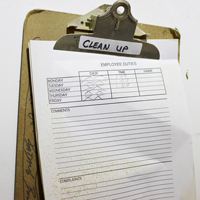 You've
been working really hard to increase your credit score. You've done
everything you thought you were supposed to do to present yourself as a
creditworthy individual. So, why did your score suddenly drop? What
happened?
You've
been working really hard to increase your credit score. You've done
everything you thought you were supposed to do to present yourself as a
creditworthy individual. So, why did your score suddenly drop? What
happened?Unfortunately, this is a common occurrence with many consumers today, a situation that likely could've been avoided if you had only been working with a qualified credit improvement specialist from the beginning. Remember, there's no shame in seeking help with your credit. Credit scoring models are based on a number of factors that, when combined, add up to a formula that might not seem logical to those who don't deal with these kinds of issues on a daily basis.
The following are just a few examples of seemingly innocent actions that could cause your score to suddenly and dramatically drop.
I paid off my biggest credit card debt and closed the account, but my score dropped anyway. This is one of the most frustrating situations for many borrowers. You would think that paying off your biggest debt and closing your account would be a good thing - and it is. But, because of the five factors of credit we discussed in a previous article, this action could reflect poorly on your credit score because you chose to close the account. Depending on your situation, the account you closed could've been your oldest credit account with the highest credit limit, two major factors in calculating your score.
I maxed out my card, and even though I paid it off completely when I got my statement, my score still dropped. By maxing out your card, your overall credit ratios were adjusted. And even though you paid it off, your statement reflects your current status. In other words, your credit report shows that your account is maxed out, even if you pay it off the next day. The best thing you could've done here was to pay your bill before your statement arrived.
I was only one day late on my payment but I still received a 30-day late on my credit report. Unfortunately, your creditors do not distinguish the difference between one day and 30 days late. You must pay your monthly bills on time every time to avoid this penalty. Depending on which credit cards you have, you could suffer an additional penalty for being late on your credit card payments, even just one time. It's called the universal default clause, which could increase your interest rates on all your credit cards up to 28-30%, even if you're in good standing with your other accounts!
I paid off an old collection and my score dropped significantly. While it might seem illogical or even unfair, sometimes paying off a collection account can actually cause more harm than good. Remember, credit scoring models typically lend more weight to your recent activity than to the mistakes you might've made in the past. By paying off this old account, you may have inadvertently added more weight to this mistake from the past by making this item current.
Don't be shy about asking for help when it comes to your credit score. Remember, your credit is the most valuable financial tool you have at your disposal, and having an expert on your side is always smarter than learning the hard way on your own.
If you or anyone you know has questions about credit. Give us a call at your convenience. We'll be glad to review your credit and see what, if anything, needs to be done to help you meet your financial goals and needs.
Stay tuned for more great credit tips!
![[UPSIDE]](http://si.wsj.net/public/resources/images/BF-AB641_UPSIDE_NS_20111014202407.jpg)
 Annual income aside, there's not a person among us who wouldn't welcome
the idea of having more money in their savings account. This is the
money we use on everything from yearly vacations to family presents.
Come holiday time, wouldn't it be nice to have an extra thousand or so
dollars at your disposal? Saving money is very important as you attempt to purchase a house. Lenders look to see a pattern of saving. Furthermore, you may need a down payment to purchase a house. Here are a few ideas that can help to make that possible. The best part is you'll hardly feel it!
Annual income aside, there's not a person among us who wouldn't welcome
the idea of having more money in their savings account. This is the
money we use on everything from yearly vacations to family presents.
Come holiday time, wouldn't it be nice to have an extra thousand or so
dollars at your disposal? Saving money is very important as you attempt to purchase a house. Lenders look to see a pattern of saving. Furthermore, you may need a down payment to purchase a house. Here are a few ideas that can help to make that possible. The best part is you'll hardly feel it!